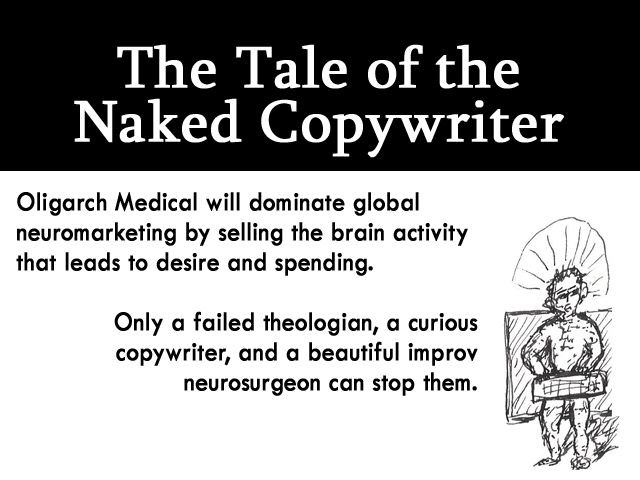Archive for the ‘texts’ Category
Business Writing Can Be Better
Let’s Worm Backwards to Walk Forward
Our goal is to say or write our idea more clearly.
Along the way we’ve picked up this notion that there might be more to communication than us just delivering thin slices of thought from head to mouth (or pen/keyboard)to our boss’s brainpan. We’re starting to think the process of communication does a bit of turbocharging to the idea and to the people on either end of the idea.

Take It From a Copywriter
That turbocharging is exactly what James Webb Young counted on. Young was an advertising copywriter who lived and wrote in the last century. His goal was to express ideas for money—he marketed products. So old ideas, cliched ideas, worn-out words and weary images—none of that would do. All that dated content was the same as saying, “Let your eyeballs slide past—you’ve seen this before and it doesn’t matter.”
Young held a particular fascination for two phases of pre-writing: preparation and organizing. His love of revision may not have been far behind. He thought new ideas were just recombinations of old ideas, so he did his best to fill his brain with all he could find out about a new product or new project or new assignment. Part of the copywriter’s role in the world is to ask the most elementary questions, because forcing experts to simplify can reveal profound truths. He wanted to know everything, much like British copywriter Tony Brignull.
Asking questions, getting information, and then stripping ideas and combining and recombining ideas and then joining ideas that are impossible to join and then splitting ideas that are fused—all this until exhaustion sets in. And then the walk-away and then, if all goes well, the “Eureka!” Read more in Young’s book A Technique for Producing Ideas.
Why Business Writing Sucks
It’s because writing is not our job. We’re engineers. Or scientists. Or physicians. Or managers. Our job is that noun or verb in our title, not writing. We’re doers, dammit! But we’re also humans, and humans learn by telling and by listening. It’s our time-honored way of becoming less stupid.
But because our work-time is focused on the important stuff of our job, we miss the important stuff of being human together. So we pick words and images from the last decade to express our new idea and then slap them on paper or PowerPoint as quickly as possible to stop the pain of writing. And then we wonder why no one cares and why the boss with the budget won’t listen.
Good communication means digging deep into why something matters. Often that involves self-revelation which also might call forth emotion. These are things humans use to communicate.
Worm Your Way Back into Your Process
To communicate in powerful ways, we must prepare ourselves and our message.
If we expect it to just happen, if we expect to throw-together some presentation, we doom ourselves to ready-made clichés and images, which are guaranteed to be ignored.
Powerful communication means going back to gather information, to ask what we want to accomplish, to think about our audience, to combine old ideas to get new ideas, to worry these ideas on paper until a fresh, revealing communication portal opens.
Along the way, expect a turbocharge that changes the idea, that changes the thinker (you), and might possibly change your relationship with the person at the other end of the conversation.
###
Image credit: Kirk Livingston
Gadamer: A Tormented Relationship to Writing
The Best Writing Sounds Nothing Like Writing
Good writing is where you remember nothing about grappling with words but are instead transported with images and ideas that appeared in your brainpan. Effortlessly—or so it seems.
This kind of effortless reading is exceptionally rare with philosophers, who are well-known for obfuscation in their pursuit of parsing detail and cleaving difference from sameness. And yet Donatella Di Cesare, the biographer of philosopher Hans-Georg Gadamer, claims Gadamer’s writing style is “lucid” with “striking prose.”
We’ll see about that.
The lucid philosopher is the exceeding rare philosopher.
I’ve just picked up Gadamer: A Philosophical Portrait by Donatella Di Cesare (Bloomington, Indiana: Indiana University Press, 2007). In the introduction Di Cesare shared about her process:
There is a further difficulty that a monograph on Gadamer should not avoid, and that is his tormented relationship to writing. In order to get around his Socratic resistance to writing, he preferred the form of the lecture, the talk, or the debate. It is not an exaggeration to say that almost everything he wrote is based in dialogue.
She goes on to say Gadamer is “always careful to interrogate everyday language and to avoid rigid terminology,” so I am eager to see how his prose ends up as lucid and striking rather than simply tedious.
What piqued my curiosity was Gadamer’s alleged privileging of oral over written. It seems his inquiry was largely based in discussion, between people, rather than one man alone with a sheet of 20# bond and a pen. Again: I’m just at the beginning of reading Gadamer. I’ve got his big Truth and Method on order, but I know from my own writing that dialogue and conversation have a pull that abstract philosophizing rarely reaches.
The best writing sounds like a conversation with an interesting friend. I’m eager to see if Gadamer achieves that.
###
Image credit: Kirk Livingston
Josephine Humphreys: When writing from the center of things
The world keeps aligning with what I just wrote.
Interviewer: When you’re writing, is it that you notice things more acutely?
Humphreys: Yes. You notice everything, and everything seems to be full of meaning and directly centered on the thing you’re writing about. I heard E.L. Doctorow say something like that—that when you’re writing, all experience seems to organize itself around your themes, which can give you some really strange feelings of coincidence and ESP. You start to think you’re onto the secrets of life.
–Josephine Humphreys, quote by Dannye Romine Powell, Parting the Curtains: Interviews with Southern Writers (Winston-Salem, NC: John F. Blair, 1994) 192
###
Image credit: Kirk Livingston
Pat Conroy: How to tell when the story has started
Sometimes Mr. Subconscious arrives at the work site before Mr. Conscious
I think dreams are very important. I think dream journals are important. Extremely important. I have dreamed the ends of books. When I start dreaming about the book, I know it’s now starting.
–Pat Conroy, quoted by Dannye Romine Powell, Parting the Curtains: Interviews with Southern Writers (Winston-Salem, NC: John F. Blair, 1994) 51
I can’t vouch for dreams, but I cannot help but notice how Mr. Conroy’s stories seem to start without him. Writing is hard work, but there’s no denying these bits where the subconscious fills in gaps at the work site before you even arrive.
###
Image credit: Kirk Livingston
“…shouldn’t give away your pie with breakfast—it makes you look cheap.”
The Reading Pulls the Funny from the Words
The Diner is an old Saturday Night Live skit (1989-1990/Season 15/aired 21 April 1990) with the late Jan Hooks and Alec Baldwin. It is a bit of genius in the way the language does double-duty, pointing at meaning far beyond the sublimated exchanges. The characters and their inevitable conflict are showcased in the writer’s words (read the transcript here). But it’s the words exchanged between Hooks and Baldwin—words that seem almost physical—that move the skit forward.
[https://screen.yahoo.com/brenda-waitress-000000407.html]
Read the transcript. It does not come across as powerful as it does in the hands of Hooks, Baldwin and the rest of the cast.
But that holds for lots of things.
Words come to life when spoken or acted on by a human. If that seems too philosophical, consider how much copy you read that is lifeless because you cannot hear any human voice. This is why press-release quotes from CEOs sound so wooden. No human speaks that way. On the other hand, some books remain in our lives precisely because they capture the human voice so well. For me, the old poet-king and the gospel writer John portray the human voice so accurately that I return to them daily. Ian McEwan’s Atonement also did that for me recently.
What words will you act on in 2015?
###
Image Credit: SNL/Yahoo
Wait—English Majors Win in the End?
Start Writing Your Own Future
- Announce your goal to lose weight and chances are better the pounds will flee.
- Sign up for NaNoWriMo and chances are better you will actually write that novel (no matter how badly it turns out).
What we tell each other has a way of happening. What we tell each other about our preferred futures has a way of guiding next steps.
- Write a letter to your collaborative, inventor friend about a business idea and find yourself planning concrete marketing and distribution steps at Spyhouse Coffee.
- Write a business plan for your startup and suddenly remember your friend who became a venture capitalist. And then remember the friend who bootstrapped her idea.
See the pattern? Each step forward started with communication. You may say,
“No. the idea came first.”
True—maybe.
But consider: the communicated idea created a spark. And—given the right collaborative conditions—the spark lit a fuse. And the fuse burned, gathering other ideas until the explosive, disruptive future no one had considered.
What if English majors learned entrepreneurship and began to see their talent for orderly, persuasive, deeply-rooted writing as a way to help themselves imagine new futures and chart forward-movement for others? What if they learned to solve real-world problems with story and emotion and analytics? Their solutions would drop-kick the spreadsheet & PowerPoint crowd. What if some English majors created Lake Wobegon while others created the next Google?
What if English majors learned business lessons alongside the standard fare of reading and writing? What if they were expected to serve up the occasional business plan or marketing strategy along with the usual essay, short story and poem?
If that happened, English majors would connect earlier in life that art and work and commerce and fiction and meaning-making all fit together in the same world. And they would begin to write their own future vocation.
By the way: 16 Wildly Successful People Who Majored in English
###
Caveat #1: I was never an English major.
Caveat #2: I teach English majors. They are smart, innovative people.
Image credit: Kirk Livingston
“Writer without permission.”
Write On Your Own Dime
A new LinkedIn friend in the Minneapolis/Saint Paul area has a job title “Writer without permission.” The genius of her title is to say out loud what most every writer is thinking—nobody asked for this, nobody gave me permission, and frankly, no one is waiting for me to finish it. The whole thing is entirely self-motivated.
Let there be more of her tribe.
Writers often stop mid-sentence and think,
I am entirely unqualified to write this. When will someone knock on my door and say, ‘Hey—Stop it: You got no business writing that.’?
When those Philip Glass moments occur, whether real or imagined, the writer without permission pauses and then continues the sentence. And the next sentence. And so on—breezing past the “No Trespassing” signs posted around the perimeter of the topic.
If you are waiting for someone to say, “You should write about X.” You have a long wait. If you are waiting for a fat check to cover expenses while you draft your manuscript, well that isn’t likely. Although I did chat with someone two weeks ago who received a sabbatical from her job to write a book. So, miracles do happen… and all that.
New stuff happens when we start writing without permission. But the alternative is also true: maybe nothing will happen. Maybe it will fail. Given all the books and writing and words floating around today, failure is likely. Then again, what is success or failure? If just getting your story out is success (I happen to think it is), then start writing. If success is getting famous, well…miracles do happen (and all that).
But there is something more to the kudos and the paycheck—it is a kind of validation that you are doing a good thing, a worthwhile thing, an important thing. It’s as if we need someone else’s validation to gather gumption and move forward. But what if someone won’t even understand what you are doing until you are done—because you yourself are working out the details? And you don’t fully understand it. Not yet.
We celebrate the creative genius of long-dead writers. But how many knew they were writing some landmark story until much later—or ever? Most had to battle the “No Trespassing” signs and the missing fat paychecks. And they created anyway.
Do you need permission to create the thing you cannot stop thinking about? You have my permission, for whatever it is worth.
Don’t put off creating.
Start today.
###
Image credit: Kirk Livingston
Mind-reading and the Perfectionist’s Dilemma
“Come here, you big, beautiful rough draft.”
You know what needs to be done.
You know how to do it.
But—given your schedule—you simply cannot attend the details. What you want is to jump to editing the rough draft—but who’s got time to create that rough draft?
We could be talking about drafting an email, an article or a chapter. We could be talking about a curriculum for a class or a seminar. We could be talking about writing a memo to employees or a letter to partners or a speech to stakeholders—anything that requires focused attention for a time so you can spin out and organize the details. We’re talking about anything you need to create from scratch to deliver to others. Any communication that solves a problem you’ve noticed.
Now is when you need an assistant who can move forward without hand-holding. Now is when you need someone who knows what you know without you telling them. Now is when you need a mind-reader.
But there are no mind-readers.
Are there no mind-readers?
I won’t say copywriters are mind-readers. I will say I find myself in situations every week where my client has provided 15-25% of the details but expects our project to organize 100% of the content in a coherent, compelling fashion.
Sometimes I wonder if our close friends, colleagues and collaborators serve as near-mind-readers. With them we feel free to spit out the raw bits of what we know. And as we say it, we realize what we need to do next. To tell someone what is on our mind is the first step to accomplishing a task. Those conversations are a kind of verbal rough draft.
Don’t be intimidated by the blank page. Embrace the notion of doing something mostly wrong and partly right, which is to say, embrace the rough draft.
It is much easier to change words on a page than it is to put words on a page.
###
Image credit: Kirk Livingston




![[Click to play.]](https://conversationisanengine.space/wp-content/uploads/2014/12/alecbaldwinsnlthediner-12262014.jpg)




